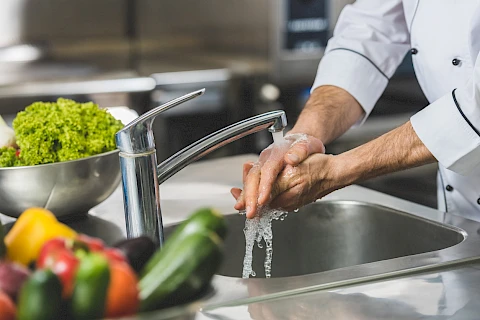
Seniors have a higher risk of foodborne illnesses due to changes in their immune system and other health conditions. They are more likely to be hospitalized and to be sick longer. Senior Helpers is here to provide essential safe cooking and food storage tips for seniors. We cover the importance of proper food storage, handling, and preparation techniques to help prevent foodborne illnesses.
Proper Food Storage
Good food storage practices can help maintain the quality and safety of your food. Here are a few food storage tips:
- Pay attention to temperature. Keeping food at the right temperature prevents bacterial growth. Perishable foods should be stored in the fridge at 40°F or below. Freezing food at 0°F helps to keep it safe for longer periods. Make sure your refrigerator and freezer are set to the correct temperatures.
- Organize your fridge and freezer. Store raw meat, poultry, and seafood in plastic bags or containers on the bottom shelf to prevent juices from dripping. Keep ready-to-eat foods and leftovers on the upper shelves where they are less likely to be contaminated.
- Check expiration dates. Always check expiration dates and "use by" dates on food products. If a food item looks or smells off, it is best to discard it. But don't rely solely on these dates. Use your senses to detect spoilage.
Safe Food Handling
How you handle food plays a major role in preventing contamination. Always wash your hands with soap and water before and after handling food. This simple practice helps prevent the spread of germs. Make sure to also wash your hands after handling raw meat, using the bathroom, or touching pets. Thaw meat, poultry, and seafood in the refrigerator, not on the counter. Use separate cutting boards for raw meat and other foods and wash them with hot soapy water after use. Cross-contamination can occur when harmful bacteria from raw foods spread to ready-to-eat foods. Never place cooked food back on a plate that holds raw food.
Safe Food Preparation
Different foods need to be heated to different temperatures to ensure they are safe to eat. Poultry should be cooked to at least 165°F, ground meats to 160°F, and fish to 145°F. Use a thermometer to check the internal temperature of the food. A food thermometer is a handy tool to ensure food has reached the right temperature. Insert the thermometer into the thickest part of the food away from bone, fat, or gristle. Leftovers should be reheated to 165°F to kill any bacteria. When using a microwave, cover the food and make sure it heats evenly. Stir it halfway through cooking to eliminate cold spots where bacteria can survive.
Recognize Foodborne Illnesses
Symptoms of foodborne illness can include stomach cramps, diarrhea, vomiting, and fever. These symptoms can range from mild to severe and usually appear within a few hours to several days after consuming contaminated food. If you experience severe symptoms like high fever, blood in your stool, persistent vomiting, or signs of dehydration, seek medical help immediately. Prompt treatment can be crucial. To reduce your risk of foodborne illness, always practice safe food storage, handling, and preparation.
Senior Helpers Understands Food Safety
Senior Helpers offers a wide range of customized, in-home senior care services. If you live in Hollywood, Fort Lauderdale, or Miramar areas, contact us anytime at Senior Helpers Broward County. We are always ready to provide personalized assistance in safe cooking practices and ensure you are enjoying the healthiest and happiest life possible.